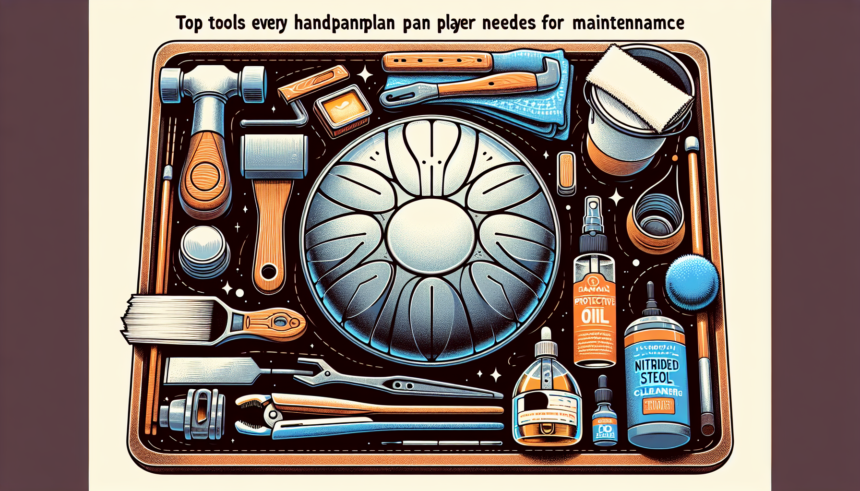Handpans are unique and mesmerizing musical instruments that require proper care and maintenance to ensure they remain in top playing condition. Whether you’re a seasoned player or just starting, having the right tools at your disposal can make all the difference. In this article, we’ll explore the top tools every handpan player needs for maintenance, ensuring your instrument stays in optimal condition and continues to produce beautiful sounds.
1. Microfiber Cloths
Microfiber cloths are essential for maintaining the finish of your handpan. These soft, lint-free cloths are perfect for wiping down the instrument after each use, removing any fingerprints, dust, or other particles that can accumulate on the surface. Regularly cleaning your handpan with a microfiber cloth helps to prevent the buildup of oils and grime that can affect the sound and appearance of the instrument.
2. Handpan Polish
Handpan polish is specially formulated to clean and protect the finish of your instrument. Using a polish specifically designed for handpans ensures that the surface remains free from tarnish and prevents rust from developing. When applying polish, use a gentle, circular motion with a soft cloth to achieve the best results. Regular polishing not only keeps your handpan looking its best but also enhances its durability.
3. Tuning Hammer
A tuning hammer is an indispensable tool for any handpan player. Over time, the notes on your handpan can become slightly out of tune due to temperature changes, humidity, or playing techniques. A tuning hammer allows you to make precise adjustments to the notes, ensuring that your handpan always sounds its best. It’s important to use a tuning hammer specifically designed for handpans, as these tools are crafted to produce the right amount of force without damaging the instrument.
4. Rubber Mallets
Rubber mallets are another important tool for adjusting the tuning of your handpan. While the tuning hammer is used for fine adjustments, rubber mallets can help with more substantial tuning changes. These mallets come in various sizes and weights, allowing you to choose the one best suited for your handpan. Using rubber mallets correctly can help you achieve a perfect, harmonious sound.
5. Desiccant Packs
Desiccant packs are small pouches filled with moisture-absorbing materials, such as silica gel, that help protect your handpan from humidity. Excessive moisture can lead to rust and other damage, so it’s important to store your instrument in a dry environment. Placing desiccant packs in your handpan case or storage area can help keep the humidity levels in check, ensuring the longevity of your instrument.
6. Travel Case
A high-quality travel case is essential for transporting and storing your handpan. Look for a case that offers ample padding and protection from impacts, as well as a secure closure to keep the instrument safely inside. Some cases also include compartments for accessories, making it easier to keep everything organized. Investing in a durable travel case ensures that your handpan remains safe during transport and storage.
7. Humidifier
While keeping moisture at bay is crucial, extremely dry conditions can also be detrimental to your handpan. A humidifier can help maintain a balanced environment, particularly in dry climates or during winter months when indoor humidity levels can drop significantly. Using a humidifier in the room where you store your handpan can help prevent cracks, splits, or other damage caused by excessive dryness.
8. Cleaning Brush
A soft-bristled cleaning brush can be useful for removing dirt and dust from hard-to-reach areas, such as the indentations and around the notes. Gently brushing these areas helps to keep your handpan clean without scratching or damaging the surface. Regular use of a cleaning brush can prevent the buildup of debris, ensuring that your handpan remains in optimal condition.
9. Protective Cover
A protective cover is a simple yet effective way to guard your handpan against dust, scratches, and other environmental factors. When not in use, covering your handpan with a soft, padded cover can help preserve its finish and protect it from potential damage. Look for a cover specifically designed for handpans to ensure a perfect fit.
10. Lubricant Spray
Lubricant spray is another valuable tool for maintaining your handpan. A light application of lubricant can help prevent rust and corrosion, particularly in joints or seams where moisture might accumulate. Be sure to use a lubricant that is safe for use on metal surfaces and follow the manufacturer’s instructions for proper application.
Conclusion
Maintaining your handpan requires a combination of regular cleaning, protection from environmental factors, and occasional tuning adjustments. By investing in the right tools, you can ensure that your instrument remains in excellent condition and continues to produce its distinctive, harmonious sounds. From microfiber cloths and handpan polish to tuning hammers and travel cases, each tool plays an important role in keeping your handpan at its best. With proper care and attention, your handpan will provide you with many years of musical enjoyment.
FAQs
1. How often should I clean my handpan?
It’s a good idea to wipe down your handpan with a microfiber cloth after each use to remove fingerprints and dust. You can use handpan polish as needed, typically once every few months, depending on how frequently you play.
2. Can I use any cloth to clean my handpan?
No, it’s best to use a microfiber cloth as it is soft and lint-free, which prevents scratching and leaves no residue on the surface of your handpan.
3. Are tuning hammers and rubber mallets easy to use?
While they are essential tools, using them requires some practice and knowledge. It’s recommended to seek guidance from experienced players or professional tuners when adjusting the tuning of your handpan.
4. What should I do if my handpan gets wet?
If your handpan gets wet, dry it immediately with a soft cloth. Store it in a dry place with desiccant packs to absorb any remaining moisture and prevent rust.
5. Is it necessary to invest in a travel case for my handpan?
Yes, a high-quality travel case is crucial for protecting your handpan during transport and storage. It helps prevent physical damage and environmental exposure, ensuring the longevity of your instrument.





